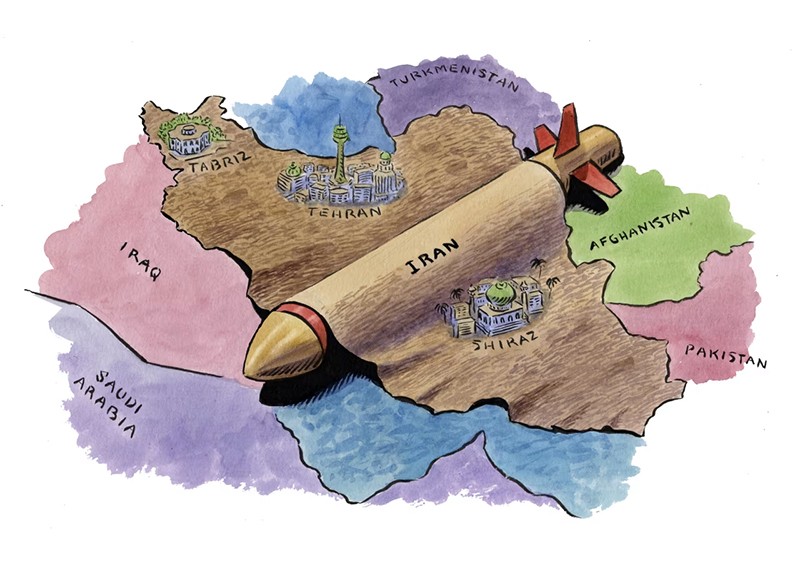
Will he finally authorize an attack, or will he reprise Obama’s 2015 ‘worst deal in history’?
By Karen Elliott House. WSJ.
After weeks of indirect talks, President Trump will soon have to make a decision on the future of Iran’s nuclear program. The only honorable option is to dismantle it. This can be done through diplomacy, which is highly unlikely, or with force. Any other outcome endangers both Israel and Saudi Arabia, key U.S. partners in the Middle East, and destroys Mr. Trump’s credibility with the world.
The president adamantly—and repeatedly—has insisted he will accept nothing less than “total dismantlement” of Iran’s nuclear program. The mullahs in Tehran will never agree to that. They saw what happened to Ukraine and Libya after giving up their nuclear ambitions. They think that enriching uranium for their nuclear reactors is a national right. Their real goal isn’t electricity generation but the ability to produce material for a bomb.
America’s partners are getting nervous. Will Mr. Trump keep his word and obtain “total dismantlement” by force? Are these talks led by Steve Witkoff, a presidential golfing buddy with no diplomatic experience, simply a feint to portray the president as a patient peacemaker before supporting an Israeli strike on Iran? Or is Mr. Trump truly so eager for a deal he will accept something akin to the “worst deal in history,” signed by President Obama in 2015? Saudi and Israeli leaders are united in their fear that it is the latter.
As the president heads to Saudi Arabia this week, his host, Crown Prince Mohammed bin Salman, must feel trapped. If Mr. Trump agrees to a bad deal that allows Iran to develop nuclear weapons, the mullahs can destabilize Saudi Arabia by attacking its oil facilities and many expensive development projects while hiding behind the protection of their nuclear capability. Alternatively, if no deal is reached and Mr. Trump approves an Israeli strike on Iranian nuclear facilities and other key infrastructure, the kingdom almost certainly will be Tehran’s first target for revenge.
Iran’s defense minister warned May 4 that “if war is initiated by the U.S. or Israel, Iran will strike their interests, bases and forces wherever they are and whenever necessary.” The U.S. has several air bases in Saudi Arabia that would be targets. More specifically, Iran warned Saudi Arabia not to allow Israel to use its airspace for an attack on Iran, threatening destructive retaliation. To hedge his bets, the crown prince recently dispatched his brother, Defense Minister Khalid bin Salman, to meet personally with Ayatollah Ali Khamenei in Tehran, the first Saudi official to do so in nearly 20 years.
Mr. Trump recently has raised Iran’s ire by pledging to impose secondary sanctions on nations that buy its oil. Despite U.S. sanctions, Tehran manages to sell 1.7 million barrels of oil a day, mostly to China.
China wins by securing oil at a deep discount and Iran wins by receiving a lifelineof hardcurrency for its devastated economy. China would be the big loser if Iran’s nuclear and oil facilities are struck in coming months. While Beijing is facing Mr. Trump’s tariffs, it doesn’t need higher oil prices too. But higher oil prices would benefit Saudi Arabia, whose expensive development plans need $100-a-barrel oil to avoid budget deficits. U.S. shale oil producers would also benefit, as their cost of production is around $65 a barrel while oil prices are in the neighborhood of $60. Iran’s theocracy hasn’t given up on its goal to eliminate the Saudi monarchy and possess both its oil and the Muslim holy sites. The Islamic Republic’s long ambition to destroy both America, aka the Great Satan, and Israel, aka the Little Satan, is alive. Its Quds force remains an active terrorist group.
But the mullahs have never been weaker. At home, public discontent is rising as the economy sinks. Some 30% of Iranians live in poverty. Abroad, their proxies in Gaza, Lebanon, Yemen and Syria have been weakened or destroyed over the past year. Most important, Israel’s devastating retaliatory attacks have badly degraded Iran’s air defenses, leaving the country vulnerable to future Israeli strikes. But Israel is reluctant to target Iranian nuclear facilities without U.S. approval and lacks the ability to succeed fully without the latest U.S. bunkerbuster bombs.
Now is the time for a U.S.-Israeli strike to destroy Iran’s nuclear capability. Tehran has enriched uranium well above the level needed to produce energy from its reactors, removed monitoring equipment from its uranium enrichment and production facilities and stopped allowing the International Atomic Energy Agency to inspect its uranium stockpiles. The IAEA believes Iran now is capable of producing enough highly enriched uranium for a nuclear weapon in less than a week.
All this will come to a head by October, when the 2015 nuclear deal signed by China, France, Germany, Russia, the U.K. and U.S. expires. European nations are contemplating restoration of sanctions on Iran for violations of the pact. If that happens, Iran says it will withdraw. Without even nominal international constraints, Iran could produce a bomb within a week. It may not wait until October.
Destroying Iran’s nuclear capability involves risks, and Mr. Trump wants to avoid war. But if he believes Iran can be trusted to execute a newpact, he hasn’t done his homework. If he settles for anything short of total dismantlement, it will be the moral equivalent of Joe Biden’s ignominious withdrawal from Afghanistan. Trust in his leadership will be gone. Let’s hope Mr. Trump means what he says: “If we don’t work it out, bad, bad things are going to happen to Iran.” Ms. House is a former publisher of the Journal and author of “The Man Who Would Be King,” forthcoming in July.














